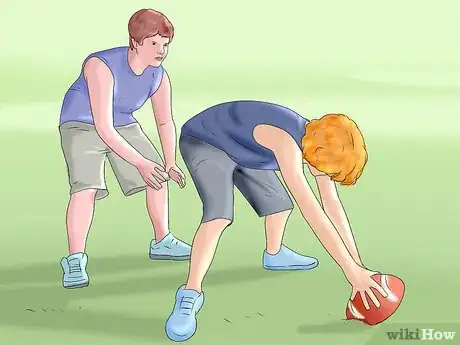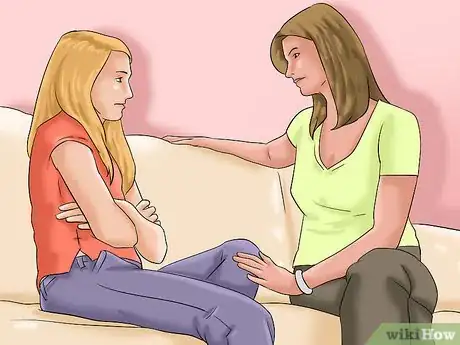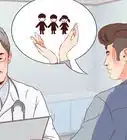This article was co-authored by Trudi Griffin, LPC, MS. Trudi Griffin is a Licensed Professional Counselor in Wisconsin specializing in Addictions and Mental Health. She provides therapy to people who struggle with addictions, mental health, and trauma in community health settings and private practice. She received her MS in Clinical Mental Health Counseling from Marquette University in 2011.
This article has been viewed 23,581 times.
Your parents' divorce will likely have a substantial effect on your emotions. It will affect certain aspects of your life, potentially complicating things like day-to-day logistics and holiday planning. Know that the emotions you’re feeling now or may feel later are entirely natural. Anger, sadness, anxiety, and even guilt may arise, as well as other less predictable emotions including embarrassment, loneliness, and even relief. Do your best to maintain positive relationships with each of your parents, but make taking care of yourself your main priority.[1]
Steps
Getting Along with Your Parents During a Divorce
-
1Avoid getting drawn into their conflict. It’s important that you’re able to feel comfortable about each of your parents after their divorce. One of the most important aspects of maintaining positive relationships with each of your parents is refusing to side with one of them over the other. If either of your parents try to get you to agree with them about how they see their divorce, remind them that it is their relationship, and their discussion.
- If one of your parents begins to act as though they are jealous or upset about you spending time with your other parent, tell them to stop.
- Be specific, by saying something like, “I intend to maintain a positive relationship with both of you, and you need to allow me to do so.”
-
2Maintain boundaries. Hopefully, your parents will not attempt to pit you against one another. However, you may realize that one or both of your parents begin to rely on you heavily for emotional support. This can be a challenging thing to experience, as well as a challenging thing to recognize. If you find yourself consoling a parent somewhat often, think about who else they may be able to speak with.[2]
- If they have siblings or close friends that they could talk to, reach out to those people and ask them to contact your parent. Though it may feel odd to seek help for a parent, it is likely in both your own and their best interest.
- Never allow either of your parents to act as though their happiness is your responsibility. If they make this implication, respond by saying something like, “I want you to be happy and I will support you as much as I am able, but I also need to take care of myself.”
Advertisement -
3Tell your parents to get help. Your parents are people too. It can be disconcerting to become aware of the fact that they sometimes struggle with intense emotions and need support when they’ve always been the ones taking care of you. This realization can even be traumatizing, though it will also likely contribute to your own growth.
- If your parents are struggling with persistent bitterness, anger, or depression, ask them to see a counselor or therapist.
- Tell them that a counselor will know how to help them maintain emotional stability while going through a divorce.
- Further, conclude the thought by saying something like, “a therapist can also give you pointers to help ease the stress you’re feeling.”
- Make sure that you do not start to take on the role of a counselor for your parents, such as by listening to them complain, being a shoulder to cry on, or offering advice. If you find that you are taking on this role, then ask your parents to seek the help of a counselor as soon as possible. This is not a healthy relationship to develop with your parent(s) and it can have negative emotional effects on you. If your parent continues to rely on you for emotional support, then talk to another trustworthy adult about the situation, such as an aunt, grandparent, or teacher.
Getting Used to Life Following Your Parents’ Divorce
-
1Talk about your own future. After recovering from the shock of your parents’ divorce, you’ll likely start to confront the fact that your own life will be different moving forward. This is especially true if you’re still living with one of your parents. You should ask your parents any questions you have about your future, in both the short and long term.
- Plan a time to sit down with both of your parents together, as soon as is possible. If their relationship is volatile or they are unwilling to speak with you together, make plans to speak with them separately.
- While talking about what has happened may be helpful, ask questions about what will happen moving forward. Feel free to be direct by simply asking, “What’s going to happen next?”
- Don’t worry about “adding” to what they’re going through. While you’ll likely feel this way, it’s better for everyone to communicate your concerns. You may learn that your parents have already been thinking about your future as well.
-
2Talk to your siblings. Your siblings will likely prove to be an extremely important source of support, no matter what your relationship with them was like before the divorce. The experiences you’ve shared give you better insight into one another’s lives than most. Talk about how each of your parents are doing, how each of you are doing, and what you can do to help each other, as well as your parents.[3]
- If anyone is having a particularly hard time dealing with the divorce, you and your other family members can plan to talk to them together about seeing a therapist.
- Reach out to extended family members as well. In particular, your parents’ siblings may be better able to help and support them than you and your siblings.
-
3Live your own life. Don’t put your own life on hold simply because your parents have hit a rough patch in their lives. Keep any long-term plans you’ve made, especially if you’re pursuing a significant goal. For instance, if you’re planning to move out and go to college next year, you still should. Similarly, if you intend to get married yourself in the foreseeable future, don’t start to question your own goals and intentions on account of your parents’ divorce.
- If you are having fears about the future, then try talking with a trustworthy adult, such as a parent, teacher, or religious leader. For example, you might start by saying something like, “The divorce is making me question some of the things that I had envisioned for my future. I am starting to feel fearful about ____.”
- Continue participating in normal everyday activities as well. For instance, keep going to your weekly volleyball meetup, and try to maintain an active social life.
- Keep yourself occupied with personal interests and relationships to keep your stress levels low and stay focused on your own goals.
-
4Plan ahead for special events. Holidays and celebrations may become a source of stress as you try to navigate how to include your parents, or decide when to visit them when they both may want your company. While they may be willing to be around one another to share in your accomplishments and other key events together, they may also wish to compromise, and work with you to plan to be a part of separate occasions.
- Ask your parents to speak with one another about attending events that you want them both to be a part of, such as your graduation, a big sports game, or a birthday party.
- Hopefully, they will be able to put their differences aside. You may even want to frame it in these terms, by asking if they’d be willing to focus on the positive for a day, in the interest of enjoying a special occasion altogether. Try saying something like, “I know you two have a hard time being around each other, but I was hoping we could just have a day to focus on this milestone in my life.”
-
5Talk to someone you can speak freely with. Whether a sibling or a friend, you need to be able to tell someone how you’re honestly feeling about your parents’ divorce from time to time. Another way of looking at it is allowing others to support you. Stress, depression, and sadness will all make it harder to go about your daily life, let alone maintain a happy, healthy frame of mind.
- You can also find a support group of people roughly your age who also have divorced parents.
- If you continue to struggle with mental health issues, see a therapist! A school counselor or your doctor’s office can help you find one.
-
6Try to focus on the positive. It may sound impossible, but there is likely some good that will come from your parents’ divorce. Most importantly, there was a reason they got divorced, and one – if not both – will be better off in the long run because of their separation. Meanwhile, think about what you like about each of your parents as individuals. If you continue to spend time with each of them, you’ll likely come to know them better than you did when they were together.[4]
Dealing with Your Parents’ Divorce as an Adult
-
1Don’t be too hard on yourself. You may feel like you should have “gotten over” your parents divorce long ago, or that their divorce shouldn’t bother you if it happens when you’re already an adult. It’s actually quite normal, however, for people to have strong residual feelings about a parent’s divorce, not matter your age or how long ago it occurred.[5]
- Anger about your parents’ divorce may even increase as you become more aware of how it affected you and your family.
- You may have more questions as you become more aware as well. Ask your parents these questions to prevent them from leading to resentment.
-
2Do not parent your parents. More to the point, you must insist that they do not put you in any negative situations. A risk of being adult with divorced parents is the tendency to end up playing mediator. This might happen either because you feel like you should or because one of your parents puts you in situations where you have to act as a mediator. Either way, this is unhealthy, and you need to avoid doing so. Tell a parent that pushing too much information or responsibility onto you that they need to talk to a friend, counselor, or lawyer instead.[6]
- Remind yourself that you are not responsible for helping your parents through a divorce.
- You may even need to articulate this by saying something like, “I am sympathetic about what you’re going through and I want you be happy. However, it’s unhealthy for me to be in the position you’re putting me in. There are other people it would be more appropriate to have this conversation with.”
-
3Refuse to pick sides. Even in scenarios where one of your parents made some really poor decisions, it is unhealthy to side with one of your parents over the other. In fact, it is likely that you do agree more with one of your parents than the other, particularly if infidelity, financial mismanagement, or alcohol abuse contributed to the separation. In these scenarios, it’s better for everyone to try to stay on positive terms with each of your parents.[7]
- If one of your parents starts speaking poorly about the other – even if what they’re saying is accurate – ask them to stop.
- Try “I love you both, and it hurts to hear this” or “I love you and I’m also hurt that this happened to all of us, but I need to have a positive relationship with both of my parents.”
-
4Remove hurtful people from your life. If one of your parents had been abusive to you or your other parent, do not worry about "taking sides." In this context, you and any other family members that had been victims of abuse should do everything you can to support one another.[8] Further, do not seek to maintain a relationship with a parent that had been abusive.
- If you want, tell an abusive parent that it may possible to rebuild your relationship in the future, once they've significantly changed their behavior.
- Reach out to a mental health professional or law enforcement officer whenever you believe someone is being abused, including yourself. While it may be hard to accuse someone you love of abuse, remind yourself that allowing abuse to continue will hurt people you love even more.
-
5Don’t compare your relationship to your parents’. You may not like some of the things you realize about your parents, and may even have to confront some realizations that upset you. Do not let these feelings, nor the actions of your parents, dictate what you believe about romantic partnerships in general. Every relationship is different, and it’s important to remind yourself of this when you find yourself comparing aspects of your parent’s relationship to your own.[9]
- Watch out for thoughts that regard tumultuousness in your own relationship as evidence that all relationships are “doomed” from the start. Many children of divorced parents are inclined to have these thoughts, and they can have negative repercussions on otherwise healthy relationships.
- If negative sentiments such as these arise, then there are things you can do to change your negative thoughts, such as by identifying the thoughts and actively rewriting them as positive thoughts.
-
6Talk to a therapist. Do not hesitate to meet with a mental health professional if you’re struggling with any intense emotions. Persistent sadness, melancholy, loneliness, an inability to concentrate, or simply a recurring uneasiness can all be addressed by speaking with someone. Best of all, therapist can recommend a counseling program where you can speak with others that have had similar experiences.[10]
- See a therapist soon if you’re experiencing waves of rage. These may be directed at nothing in particular, or accompany thoughts about one of your parents.
- Keep in mind that a therapist is not biased, and may be able to see a situation more clearly from the outside. They also will always consider your personal health and safety to be their main priority.
-
7Keep in touch with both of your parents. The distance between you and your parents has likely grown as you’ve grown up. It may be even greater if your parents have split up. However, it is still important to try to maintain contact with both of your parents if you are able to do so. Occasionally, make a call or send an email to let each of your parents know you care about them.
- If your relationship with one of your parents is more strained, they will still be happy to hear updates about your life. Shoot them an email letting them know of any big news in your life, and let them know about the next thing you’re looking forward to.
- It may be rough between you and your parents for a while. Remind yourself, however, that putting in the effort to rekindle relationships that have been damaged by divorce may empower you to develop stronger and more meaningful relationships that you have had before.
References
- ↑ http://www.safeteens.org/relationships/dealing-with-divorce/
- ↑ https://www.st-andrews.ac.uk/students/advice/leaflets/divorce/
- ↑ https://www.st-andrews.ac.uk/students/advice/leaflets/divorce/
- ↑ http://goaskalice.columbia.edu/answered-questions/trouble-dealing-parents-divorce-twelve-years-after
- ↑ http://youngwomenshealth.org/2012/04/30/divorce/
- ↑ https://www.hg.org/article.asp?id=32532
- ↑ https://www.hg.org/article.asp?id=32532
- ↑ https://www.hg.org/article.asp?id=32532
- ↑ https://www.hg.org/article.asp?id=32532











































































